A Hucknall History
Religious Influences
Parish Roots of St Mary Magdalene
Huthwaite shares ancient historic ties lay within wider parish town borders of Sutton-in-Ashfield, and since time King Edward the Confessor
asserted his crowns Manorial divisions. The Domesday book only recorded a far greater influential Mansfield manor included two churches with priests. Archaeologists generally agreed many early Norman built stone churches very often replaced previously sited wooden christian places of worship. That led proud Sutton town historians trusting one of those already served their parish. Earliest dating from this site however, came through renovations exposing some internal timbers claiming 1115 origins.
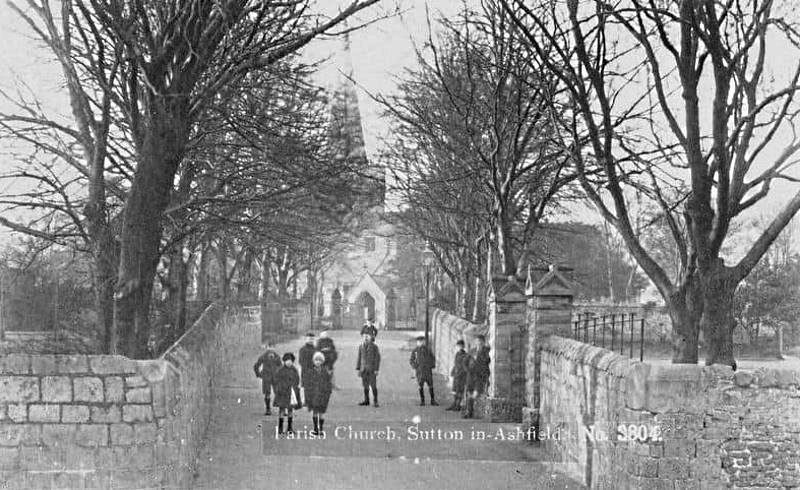
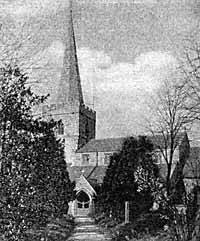
No denying Christianity went beyond a major national influence. When wealthy gentleman delved into publishing local histories, stout parish church beliefs focused on developments authoritatively offered by their leading clergy members. Sutton historians understandably promoted their towns recognition on that basis. Referring to their broadening research can dismiss need here rewriting specific detailing throughout long lifetime of St Mary's church.
Present stone building was apparently commenced 1179 by Walter de Sutton. After his fathers death, Gerald regardingly presented it to Thurgaton Priory in 1189. Moving family into Lincoln around 1288 is when Oliver was made a Bishop, although links with de Sutton name remained with this church into 1391, when John financed construction of its tower.
Edging Nottinghamshire's far west border, these Sherwood forested lands remained under successive ownership of English kings. To claim privilege of being untaxed by the crown, failed to realise far heavier penalties were imposed strictly protecting lands deemed under forest laws. Nevertheless, a 13th century Testa de Neville
recording land fees did reveal Huthwaite lay within the whole villa of Sutton-in-Ashfield under the local lordship of Jordan de Sutton. His 1295 rent survey had listed tenants, estimating a total population about 400. All widely spread farmsteads would by then be religiously tied to this parish church.
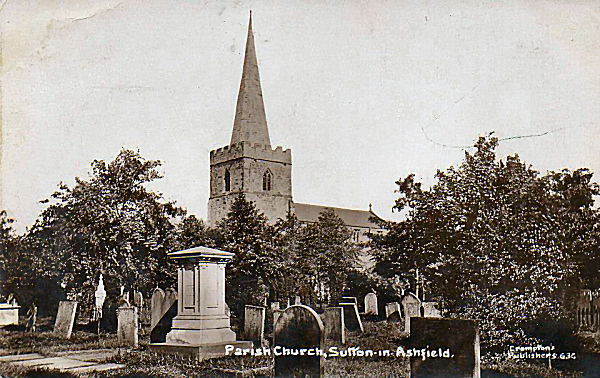
Housing a nearby priest would offer current naming behind Priestsic Road. Their Monastic services lasted until Henry VIII's 1538 dissolution. Bought by kings commissioners, and since removed from its Church of Rome and Cathedral of Lincoln, this property dedicated to Saint Mary Magdalene became owned by James Hardwick. Tithes conveyed at the Reformation record it passed through other notable owners reclaiming local manorial status. From Bess of Hardwick Hall to the Cavendish family, through Earls and later Dukes of Devonshire before the Bentincks. A Duke of Portland was then handed most lands and properties in this area by a Forest Enclosure Act, thereafter titling our overruling Lords of the Mansfield Manor claiming Welbeck Abbey residence. It was under the newly formed Church of England when transferal of all district parish guidance came under Southwell Minster diocese.
Learned parish leaders would begin long keeping records of entrusted affairs. Their ruling council powers are revealed by 20th April 1675 when Churchwardens present the following: Isaac Roobotham, nailer, and Joseph Key of Durty Hucknall, for not coming to their parish church to hear divine service or sermon for three months last past, and not receiving the holy communion. Second churchwarden, William Rushton, originally stated to be 'egrotat' (sick), but he has subsequently signed the presentment bill.
Among religious duties performed through Sutton-in-Ashfield parish church of St Mary's, they established schools of learning
aimed at teaching poorer children how to read the bible. Examples of earliest provisions for educating Huthwaite residents dates from 1669 in the Will of Ann Mason. A married daughter of an influential Langford family, she left past address of Fennybank Close in Hucknall-under-Huthwaite with Trustees appointed for teaching the poorest children in Bible reading. Similar 1724 motive found Elizabeth Boot additionally bequeathed her lands addressing Pot House Close in Fulwood raising rent towards shared purpose.
Noted among several major structural changes were repair of fire damage, and tower blocks blasted away by lightning strike. But modifications mainly aimed at improving services. Adding seating pews and, much later an organ after accommodating increasing congregations. Combined parishioner numbers rapidly rose through industrial years of 1800, when the population of this secondary hamlet alone claimed 500 residents. Allocating a separate 1826 curate just to service its north Hucknall Huthwaite Aisle
should have given fare warning to neglected needs of remoter parishioners. When the framework knitting industry greatly supported a population nearer 1,000, by 1840 a disproportional number of alienated workers welcomed nonconformist christian faiths.
The lamented writer Rev William Goodacre departed this life peacefully on the evening of Sunday, the 13th of November, having previously left instructions for this Address to be printed and distributed, immediately after his death, amongst his Parishioners. Mr C. Plumbe Machine Printer, Sutton, Mansfield, and Clay Cross professionally fulfilled those wishes hereby dated November 14th, 1859
TO THE INHABITANTS
of
SUTTON-IN-ASHFIELD, HUCKNALL-UNDER-HUTHWAITE,
MANSFIELD WOODHOUSE AND SKEGBY.
My Dear Parishioners,
Once more I take up my pen to address you. It may be for the last time. If so, I pray God that you may regard my closing words; and I exhort you, I beseech you, as a dying man, do not neglect the duties of religion. We are accountable creatures, I assure you I feel it deeply ; as the time of my departure draweth nigh. An awful account must mine be.
The number of souls committed to my care makes my responsibility awful. I do not say that I have not thought of this before, but I have not thought enough of it. Who is sufficient for these things? May I hope that some will have happiness eternal, and I, under God, be the happy instrument of their salvation? How many may be in misery hereafter, and ascribe their sufferings to my neglect or unworthy conduct?
Dreadful reflection!! The love of you, my dear parishioners, the desire of your happiness, and the wish, before God, to free my own soul, induces me as I lie in bed, thus to address you. I enter into no arguments of the value of God's approval. You have your bibles to read, you have access to many good books and tracts. You have the opportunity of hearing God's word. Use these means. I known that people often regard the last words of their friends ; and it is with the hope that you will pay more attention to my words when I am dead, than when alive, that I write these few lines. Keep holy the Sabbath day.
The breach of the Sabbath is one of the crying sins of this land, especially in populous districts. I have often bewailed it amongst you. Take your children with you to the house of prayer. Instruct them in good, restrain them from evil. Many cannot go to God's house, because they have not decent clothing; I am sorry this is often really the case, but very often the money which would buy clothes is improperly spent. To go to worship God, in decent attire, is desirable, but still God looks at the heart and not the outward garb. Go in the best manner you can. Could I prevail with you to attend to the duties of the Lord's day, other duties with their attendant blessings would follow. The good is beyond calculation. Try it, but trust not yourselves, pray to God for His guidance.
My dear parishioners, - Why will you neglect the public worship of God? Many of you belong to Friendly Societies, as Odd Fellows, Druids, and others. How often have I urged this duty at your anniversaries, both from the pulpit and in our social intercourse afterwards.
The standing rule of going together to church is a public acknowledgement of the duty of serving God. You have acknowledged it - some have promised, but few have performed. Why is this? I cannot regard it as personal; the good and kindly feeling you have almost uniformly shown towards me, is a proof that it was not against me. Why then was it? It is the enmity of the heart to the things of God. It is the Spirit only that can quicken; but you must put yourselves in the way that the Spirit may reach you.
God invites all to be happy. God helps all that seek help. God forces none - because man is accountable, but He assists whatever is needful - therefore if man be not happy it is his own fault, and he must bear the consequence of being God's enemy.
Your Societies may have some abuses. One is, your annual convivial meetings are apt to degenerate into intemperance. This evil I am happy to say, of late years, has been much less. Do away with it altogether.
Now, as religion, the true fear of God, is the best remedy of social evils of any, pay more attention to your rules. Think of the bearing of that regulation of your societies, attending the House of God on your anniversaries; and, as I have often said to you personally, so say I now, with my dying breath. Be consistent members, and worship God weekly, for the sake of your own souls and your dear children's souls.
Pay more regard to my successor than you have done to me. I mean, pay regard to his instructions. Personally you have been kind to me, and I do not complain ; but the power of sin has more prevailed in your hearts, that my words have done. May my successor's labours be blessed to the salvation of your souls. And now, my dear brethren, if I see you no more till we meet before the judgement seat of Christ, that God's blessing may rest upon you and yours - that the Holy Spirit may assist you in your own souls, and in your dear children - that after as many comforts as the God who knows best what to bestow may see fit to give you in this world, you may, with your families, (thro' believing in and obeying Jesus Christ), arrive at eternal happiness, is now, and at the hour of death, will be the fervent prayer of your friend and pastor.WILLIAM GOODACRE.
Divine services were eventually brought into Huthwaite through construction of its first National School house. Land off Hopkins Lane together with £450 towards costs were 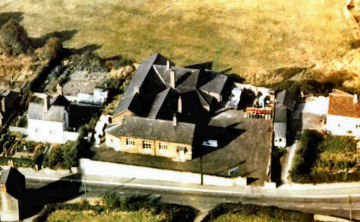 presented by the Dowager Countess of Carnarvon in great charitable support behind idea providing full time education. Building was completed 1867 under Rev Charles Bellairs, also naming that vicar of Sutton starting to separately conduct his Sunday afternoon services here. Licensed evening services were given by Mr C B Beecroft, Sutton's Lay Reader.
presented by the Dowager Countess of Carnarvon in great charitable support behind idea providing full time education. Building was completed 1867 under Rev Charles Bellairs, also naming that vicar of Sutton starting to separately conduct his Sunday afternoon services here. Licensed evening services were given by Mr C B Beecroft, Sutton's Lay Reader.
Further charitable funding was raised 1873 next providing a Hucknall Huthwaite Curate. That again came from the Countess, plus other eminent people including Hon C L Lyttleton, Lord Robarts, MP W H Gladstone and Rev C H Prance
Opening a New Hucknall Colliery predicting employment for 1500 coal workers, offered a number more than double the entire existing Hucknall-under-Huthwaite population. Significance is obvious. Before year 1900, village numbers exploded beyond 4000, all still reliant upon Sutton Parish Vestry administering full rights of baptism, costly ceremonial marriage and burial.
Legality of those roles continued through an Anglican Church of England wielding antiquated powers of local government. The long parish history offers no mention behind persecution of Quakers, although that was only one minor national atrocity in the name of God, before eventually tolerating further Methodist movements. Parish guardianship responsibility supporting neediest parishioners was deemed compassionate care, until passing financial losses over to future control for elected Boards of Town, District or County Councils to provide larger Workhouses. The growing 19thC workforce generally left Parish services to a wealthier influential elite.
Learned Christian leaders remained greatly influential throughout establishment of free national and compulsory schooling. Sutton clergy seemed slow meeting any separate needs of remoter Hucknall Huthwaite parishioners, but took credit helping organise the first village school house serving dual purpose. Licensing finally introduced devotional services, while lessons promoted beliefs.
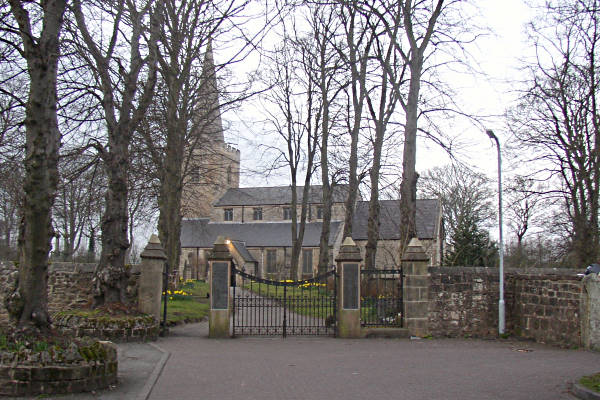
01 Aug 02 by Gary Elliott Updated 14 Nov 21
